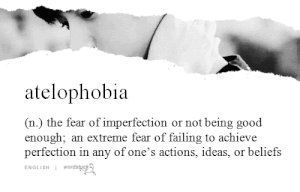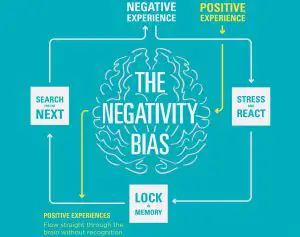What is one thing that is harder to handle than failure?
It is the fear of failure.
We have all experienced this to some degree or in some form – performance anxiety, the fear of judgment, or avoiding intense relationships, they’re all forms of the fear of failure.
This fear of failure stems from the unrealistic belief that anything less than perfection or absolute success is unacceptable. On the spectrum of this dysfunction – Atelophobia is the full-blown manifestation.

Table of Contents
So, what is Atelophobia?
Think of it this way, We all have some expression of fear in our personalities – fear of failing, of judgment, of ridicule, and rejection, that stops us from pursuing relationships, asking for a raise, trying for a new job, and the like.
However, when you have Atelophobia, your endeavor for perfection can become obsessive and irrational; it can even paralyze you.
Atelophobia is a compound word that can be broken down to reveal its meaning – the Greek word ‘atelo’ – means imperfection, and ‘phobia’ – means fear.
But, unlike perfectionism, atelophobia isn’t merely the need to be perfect or the fear of being unable to attain perfection. Although similar, there’s a fine line between the two.

Have no fear of perfection – you’ll never reach it.
While perfectionism isn’t always unhealthy, atelophobia is considered a mental illness (a kind of anxiety disorder) that requires special attention and treatment.
The commonalities between Atelophobia and perfectionism make the diagnosis of Atelophobia difficult. Just because someone is afraid of being imperfect doesn’t necessarily mean they have Atelophobia. Those who suffer from Atelophobia develop avoidance behaviors and are caused a significant amount of emotional distress.
So, how do you figure out if something’s wrong?
You lookout for the common signs and symptoms associated with this phobia.
Symptoms of Atelophobia
An extreme fear of failure characterizes Atelophobia. Everything that is less than perfect is labeled a failure. A person with such a belief system starts avoiding unknown situations and becomes incapable of using their real skills and abilities. They become unable to acknowledge the strengths that make them unique. The symptoms of Atelophobia and both mental as well as physical.
Physical Symptoms of Atelophobia:
Let’s start by looking at the physical symptoms first. Some of them are –
- Dizziness or nausea
- Increased perspiration and hyperventilation (due to severe stress)
- Panic attacks
- Oral and skin problems
- Losing sex drive
- Increased muscle tension
- Extreme restlessness
- Increased irritability and sense sensitivity
- Heart issues
- Sleep problems or insomnia
You might say that a lot of these symptoms are similar to those associated with an anxiety disorder. So, what exactly sets apart atelophobia from an anxiety disorder?
The difference lies in the root that is causing these symptoms. In cases of atelophobia the associated mental and emotional symptoms stem from an attitude that says- either I will do it well or not do it at all.
To understand Atelophobia better, let’s have a look at the associated emotional and mental symptoms.
Emotional And Mental Symptoms of Atelophobia
It’s possible to diagnose Atelophobia by paying close attention to how someone functions. Constant worrying, not accepting the challenges, always wanting to run away from the situations, and experiencing a high level of emotions like anger, sadness, jealousy, and hurt – are some of the symptoms associated with Atelophobia.
Let’s look at them one by one.
1. Being terrified of flaws
While it’s okay to be nervous before an important event, someone suffering from Atelophobia experiences such an intense terror, that in their head, the nervousness translates to – ‘If I do this, I might die.’
Simply put, they have unusually strong responses to thoughts about imperfection.
2. Depicting avoidance behavior
Someone suffering from Atelophobia will go to any extent to avoid a situation where they sense a probability of failure or of them not being good enough to fulfil/handle it.
Slowly, this becomes a part of their personality.
3. Setting impossible standards
Those who have Atelophobia set astronomically high standards for themselves, ones that are almost impossible to meet. This can result in a difficulty in functioning at workplaces and in general.
They become highly critical of their own work and are always on the lookout for mistakes.
4. They’d rather do nothing than do something incorrectly
Those who suffer from Atelophobia become their own enemies by being extremely over-critical about themselves which can lead to severe difficulty in functioning.
They stop taking action because anything that falls short of being perfect is wrong as per their self-defined standards. For them, perfectionism becomes the biggest enemy of performance, and the fear of failure cripples them.
How does one overcome Atelophobia?
The great irony is that while perfectionism has an intense drive for success, it comes with a crippling fear of the consequences of failure.
Fear of failure is not exactly the ideal motivator for success. In fact, it leads to self-sabotaging behavior and procrastination.
Whether it is as simple as the butterflies in your stomach before a performance or not trying anything new due to the fear of failure, this will affect the quality of your life.
But don’t worry, learning to manage it is possible.
If your personality exhibits the patterns mentioned above, it’ll be benefial for you to seek professional advice. Through psychotherapy, it’s possible to correct flaws in your thinking patterns and to focus on relaxation.
Below, we’ve listed some of the possible treatments of Atelophobia.
- Exposure Therapy – In this therapy, the patient is forced to face their fears so that they can overcome them. By repeating this treatment over and over again, the mind eventually halts the negative loop of fear and inaction.
- Cognitive Behaviour Therapy – Through Cognitive Behaviour Therapy, the psychologist tries to modify the negative pattern of thoughts. At least 10 to 20 sessions are required to get results from therapy.
- Group Therapy
- Meditation
- Hypnotherapy
- Energy Psychology
- Anti-Anxiety Medication
Sometimes a mixture of two or more treatments from the above-mentioned list might be required to help the patient.
It’s recommended to seek professional help to overcome Atelophobia. However, if you wish to learn to manage this fear of failure of your own, we have also listed five strategies that will help you handle this fear of imperfection and engage fully with life.
Work on your mental game – overcome it when it starts
The anatomy of the fear of failure
The fear of failure is not a problem in your rational mind. It is more of a primitive evolutionary response that stems from the “fight or flight”.
It arises from the Complex Planning that goes on at a nonverbal level in our brains. Complex planning is a subtle skill: it requires you to both conceive future steps and evaluate whether these steps are a good idea. This served us well in the early stages of humanity, wherein we were fighting for survival.
Unfortunately, the same tendency trips us in our everyday situations that have hence evolved from having life and death consequences. This often creates an instinctive dialogue within our emotional selves and urges us to choose safety over growth.

After that, the negativity bias also comes into the mix and makes us focus more on the possible failed outcomes rather than successful ones.
The University of Pennsylvania’s study on ‘negativity bias and negativity dominance’ says that negative entities are stronger than the equivalent positive entities, and combinations of negative and positive entities yield more negative evaluations.
When this happens over a long period of time, we develop the self-schema of all the reasons that we are not good enough and are inevitably going to fail. So even when a new opportunity comes, we end up reckoning it with our existing beliefs and not trying for it.
Japanese Proverb
Fear is only as deep as the mind allows.
Right now, your brain is equating failure to death. The only way to prove it otherwise is to show it.
You can do this by overriding the negative voice that preaches unnecessary caution.
Whenever you feel anxiety or fear in the face of an opportunity, write down all the negative consequences popping into your mind.
Now, counter each of them with corresponding positive consequences. You can even add an if-then narrative that outlines the actions that you can take if the worst-case scenario comes true.

Start working with bite-sized goals which you can afford to leave unfulfilled. With practice, this process will become more instinctive and intrinsic.
Atelophobia makes you feel powerless to change the situation. By analyzing your options and doing a mental rehearsal, you feel in charge and prepared for the situation, and hence, counter its effects.
Reframe your story – success is not an ‘either/or’ option, include ‘some’ in your narrative.
The effect of success or failure has more to do with how we process it rather than the actual event itself.
Rewrite this narrative by evaluating how you are processing your decisions, judging the outcomes or even setting the standards for yourself.

Perfectionists aim for unrealistic goals and impractical standards of performance. This mentality of maximization often sets them up for failure even before they have begun. It also stops them from enjoying the fruits of their labor.
Evan Polman’s study into ‘happiness levels of maximizers vs. satisficers’ found that ‘maximizers are better at decision making, but their experience of these outcomes is subjectively worse’.
The fear of imperfection leads us to see our achievements in either black or white. This makes us risk-averse and develops the ‘go big or go home’ mentality. Being in this mental space robs you of the opportunity to exercise your innovation and creativity.
Dr. Bill Knaus, author of The Cognitive Behavioural workbook for Anxiety, says that perfectionists think that their self-worth is dependent upon achieving perfection in a given situation. Thus, partial completion simply remains out of question.
A perfectionist will further escalate the situation by equating a single isolated failure to conclude her skills, abilities, and personality. So, her narrative goes from, “I failed at this” to “I am a failure.”
In reality, between success and failure, there is progress.
When you avoid failure and stay in the comfort zone, you also give up the chance to develop skills that can help you cope with future challenges.
Most of our anxiety and fear stems from the pressure that we feel to make the perfect choice and from worrying too much about not making the wrong choice.
If you take yourself out of this mental corner, your opportunities expand. Why not try to view decisions as a bouquet of different choices?

Each choice comes with its own cost and benefits, and we only need to pick the option that is good-enough rather than the “best” option.
Context makes all the difference in the world. Always try to view events concerning the larger scheme of things.
So, expand your goals to recognize the new skills and abilities acquired.
Just do it – embrace the fear of failure to overcome it
Failure or its fear is not a pleasant sensation, but it is natural.
Being in a state of optimal anxiety can enhance your performance.
The fear of failure can help you prepare better and keep you on your toes. But its unhealthy manifestation can paralyze you into becoming a spectator of life, one who is afraid to participate.

Fear is a limiting emotion.
Gregory Berns, a neuroeconomist at Emory University, explains that “when the fear system of the brain is active, exploratory activity and risk-taking are turned off. Fear prompts retreat,”
When we are attacked by the fear of failure, logical thinking is replaced by overwhelming emotions, thus favoring short-term solutions and sudden reactions.
Even worse, there is a possibility that you could pass on this fear to your children, hindering their ability to experiment and grow.
When you experience atelophobia, it means that you are expanding your boundaries. You are breaking down the mental and skill-based barriers.
As you progress along this path and take on bigger challenges, your barriers will rise proportionately. Dealing with these challenges will also improve your skills, knowledge, and competency.
If you do it over and over again, failing will become familiar, and you will fear the barriers less each time.
Repeated exposure lowers the psychological fear response. Stanford neuroscientist Philippe says, “Exposure is hands down the most successful way to deal with phobias, anxiety disorders, and everyday fears of any sort.”

Regret for the things we did can be tempered by time; it is regret for the things we did not do that is inconsolable.
Psychologists Tom Gilovich and Vicky Medvec studied ‘The experience of regret’ and came to the conclusion that, “In the long run, people of every age and in every walk of life seem to regret not having done things much more than they regret things they did,”
In the short run, you may regret failing, but in the long run, you will regret failing to try.
Know that you are not alone, join the elite club of failures
Failure is not the end; neither is it the opposite of success. It is simply a part of your journey.
Failure is nature’s way of telling you; you need to change! Failure shows the gaps in your knowledge and your ability with reference to your goals.
Everybody fails at something. Perfectionism does not guarantee success.

The anxiety about making mistakes may ultimately be holding some perfectionists back from ever achieving success in the first place.
Psychologist Tom Greenspon says, “Our research shows that successful perfectionists are successful despite it, not because of it,”
Failure is the trend rather than the exception.
Take the example of anyone you consider to be a grand success. They have all had to deal with their personal brand of setbacks.
Travis Kalanick’s startup before Uber declared bankruptcy.
Steve Jobs was thrown out of his own company.
Richard Branson failed when he tried his hands at cola business.
Oprah Winfrey was fired from her job as a TV reporter.
Same fear – a different response.
The theme of this fear remains the same, but your response to it determines how you go forward. Depending on your perspective, failure can be a roadblock that merely diverts you or the precipice that can out an to end your ambitions.

Success is not final; failure is not fatal: it is the courage to continue that counts.
J K Rowling famously said in her Harvard Commencement speech that to her, failure meant a stripping away of the inessential. She was set free because her greatest fear had been realized, and she was still alive.

Take solace in the knowledge that it is possible to go from failure to success. Failure is not something to be feared, just something to deal with.
You have the power to decide if this failure is just a footnote or your entire story.
Stop procrastinating – Now!!!
Procrastination is the most common manifestation of perfectionism and the fear of failure in our daily lives.
Perfectionists feel such a crippling fear of being not able to complete a task perfectly, that they put it off as long as possible. They are forever waiting for the things to align perfectly so that their chance at failure is zero.
In reality, between success and failure, there is progress.
Author Mark Mc Guinness says that we procrastinate for three reasons – either we don’t know what to do, we don’t know how to do it, or we don’t enjoy doing it.
Perfectionists are not lazy. On the contrary, they are hard at work – but with a misguided sense of priority.
So, they choose to do mundane jobs with a low risk of failure (like checking their mail) against doing high-risk activities (like learning a new language) that make them vulnerable.
Psychologist Dr. Fuschia Sirois says that when we procrastinate, “We’re trying to regulate our current mood and think our future self will be in a better state. That somehow, we’ll develop these miraculous coping skills to deal with these emotions that we just can’t deal with right now.”
Now to the solution – how does one stop procrastinating?
Eat that Frog – Always start with the task that overwhelms you, and you are most likely to postpone. Getting it out of the way can make way for the other work to flow.

Focusing on the whys and hows of a task instead of thinking about the abstract end goal will also help you in finishing it.
The ‘Construal Level and Procrastination’ research has found that, “merely thinking about the task in more concrete, specific terms makes it feel like it should be completed sooner” and thus it reduces procrastination.
“The Temporal Motivation Theory” holds that we will most likely procrastinate any tasks that are unpleasant in the present and offer rewards only in the distant future. Instead of focusing on the end goal as a reward, set smaller rewards for your efforts along the way.
Most importantly, set realistic goals that don’t overwhelm you. And commit to just ‘showing up’, that is half the battle won right there.
Conclusion
The choice is not whether you fail, but how willing you are to deal with it.
Even failure itself is not a terrible thing. Failure points to a gap in your knowledge or a poor strategy and pushes us to go back to the drawing board and work on making it right. Without the check of failure, progress becomes limited and complacent.
The lack of failure does not automatically equate to success, but choosing inaction definitely results in failure, which is something that you are not ready to deal with.
Effort is a requirement, commitment and dedication are vital, but perfection is unrealistic. Perfectionism is a moving target – you will never achieve it.
In life, success is the consequence of consistent effort rather than the pursuit of perfection.
3 thoughts on “Complete Guide To Atelophobia (Symptoms, Causes And How to Overcome)”